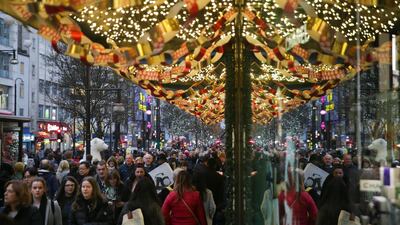The drop in British retail sales by the most on record underlines a serious difficulty for UK shops. Although fundamentals for consumers are generally good, Brexit uncertainty is keeping them from spending.
Figures released by the British Retail Consortium and KPMG show total sales fell 2.7 per cent in May from a year earlier. Excluding Easter distortions, the BRC said the decline was the worst since records began in 1995.
It was a similar picture for same-store sales, which fell an annual 3 per cent. Nick Bubb, an independent analyst, estimates that the drop in non-food was particularly severe, at 4 per cent.
A slowdown should have been expected. In May 2018, Britain was basking in a heatwave and enjoying the Royal Wedding. That boosted demand for everything from burgers to bikinis, creating a tough point of comparison.
Even so, this is a striking number. It looks as if the consumer is really holding back.
It’s strange, because shoppers are in good shape: employment is at a record high, and wages are rising faster than inflation.
But Brexit continues to cast a long shadow. The delay to the divorce moved the next cliff edge back to October, and should have taken it off the front pages and from the forefront of Britons’ minds, making them more willing to shop.
But Prime Minister Theresa May’s looming departure from Downing Street, and the ensuing Tory leadership campaign, has reignited political uncertainty. On top of this, the strong showing by Nigel Farage’s Brexit Party in European Parliamentary elections heightens the prospect of a no-deal departure.
Indeed, it seems that Britons remain nervous.
For a start, they’re probably aware that hiring could suffer if business conditions deteriorate.
And variations in pay could start to take their toll. Though increases in the minimum wage will have given a boost to lower-paid workers, some higher earners may not have seen as big a pay increase, so their spending power may not be growing as much.
In addition, the cost of living is creeping up for everyone, not least from higher gasoline prices. The middle class is starting to feel a squeeze once again. And with the savings rate already low, there’s not much scope to boost purchases by squirreling away less.
It’s worth remembering that the BRC’s figures may be too pessimistic as its membership tends to be more exposed to the struggling high street. Some similar caution is in order with retail sales data from the Office for National Statistics, whose focus on faster-growing, smaller businesses can offer an overly-rosy picture of the sector.
But even taking these considerations into account, it looks like consumers are still biding their time.
John Roberts, Chief Executive Officer of electrical goods retailer AO World Plc, said Tuesday that consumers were behaving as if they were in recession. With so much uncertainty, it seems shoppers may be unwilling to commit to expensive purchases.
The tough points of comparison won’t end – the World Cup certainly helped sales momentum last year. In 2019, another sunny spell could give stores a lift, and clarity on the plan for departing the European Union would also ease the pain. There’s not much prospect of either of those right now. Retailers won’t have much to look forward to over the summer.
Bloomberg

